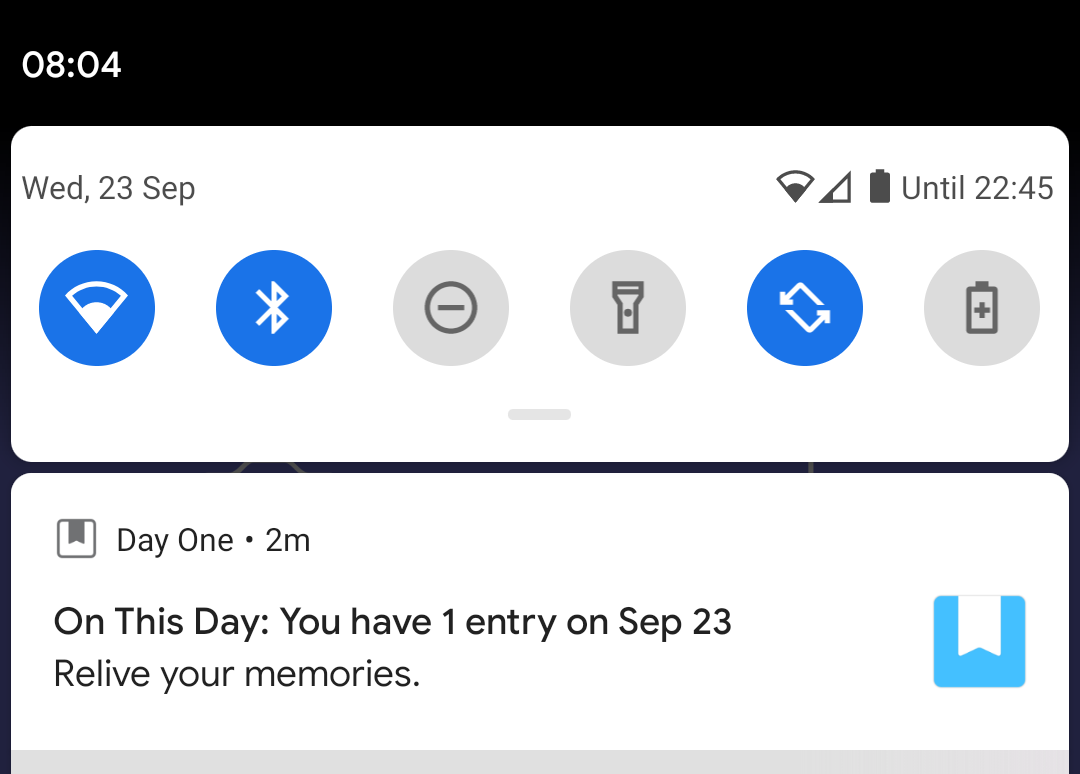-
I don’t know how this keeps happening, but it feels like the Bluetooth stack on Android gets a little worse every release. Now with Android R, it takes a good 3-5 seconds since turning on my headphones before the audio is routed to them.
-
A Database Client Wishlist
I’ve recently started a new job so I’ve been spending a bit of time trying to become familiar with how the relational databases are structured. Usually when I’m doing any database work, I tend to use the CLI clients like mysql or pg_sql. I tend to prefer them, not only as they’re usually easy to use via SSH, but the REPL is a nice interaction model when querying data: you type a query, and the results appear directly below it. Continue reading →
-
I’ve only just realised that the Victorian CHO Twitter account includes a daily Covid-19 case breakdown report. The Twitter client is such a mess so I’m trying out the Feedbin Twitter integration to get these. If it’s any better, I might add some more.
-
Sharing links to private podcast episodes
There have been times when I’ve wanted to share a link to an episode of a podcast that I pay for, but I’m hesitant to do so as the feed is private and unique to my account. The episode is also available in the public feed, but has been trimmed as an incentive for listeners to pay for the show. I can always find the episode in the public feed and share that, but I’m wondering if there’s a better way to handle this. Continue reading →
-
Friday evening walk. The photo does not do justice to how lovely the evening light can be during this time of year.

-
We are potentially two weeks away from a significant reduction in restrictions, and this weekend is proving to be a bit of a test in Melbourne’s mettle. A spate of warm weather has driven people to the beach, and there have been reports of people not social distancing or wearing masks on Friday. The police have increased patrols to enforce social distancing restrictions and the local council has threatened to close the beach if people continue to flout the rules.
I can only hope that this does not cause a spike in cases. We are so close, and it will be devastating to see the effort of the last 3 months thrown away. The good news is that colder, rainier weather is on the way.
-
A good way to be reminded of all the services you’re currently subscribed to is to have credit card that will expire soon and have all these services send emails reminding you to update your payment details.
-
After reading the recent news articles, along with hearing what the founder prioritises, it’s looking like Nikola is just another money grab a. la. WeWorks. Here’s hoping it doesn’t poison the well for non-petroleum transportation companies.
-
Let's hold the line, Melbourne. We've got this.
Today is a good day. Melbourne’s 14 day daily Covid-19 case average is now 29.4, which is beyond the 30 to 50 band required to move to the next stage of reopening. Seeing the fruits of our collective sacrifice, bringing the daily case numbers from a peak of around 740 in August down to the 11 we saw on Monday, makes me proud to be a Melburnian. As much as I like for things to reopen sooner than planned, I think we should hold the line for as long as we possibly can. Continue reading →
-
Ah, Day One. At least let me get through the day first.

-
I wonder if it’s possible to develop something like ambidexterity for Mac and non-Mac keyboard shortcuts.
-
📚 “The War of Art”, by Steven Pressfield. An excellent book about the creative process. Very easy read as well, can get through it in a weekend.
-
Good news is hard to come by recently, and the Stage 4 restrictions in Melbourne are anything but easy. But seeing 21 new cases yesterday, and 14 new cases today, the lowest in 3 months, is encouraging. Lets see how this last week of Stage 4 restrictions go.
-
I used iPad OS’s markup feature on a multi-page PDF for the first time this morning. It works reasonably well, except that there’s no way to hide the overview, and it’s positioned where I usually rest my wrist to write. The palm rejection is not perfect either, so when I try to write something, it sometimes interprets my wrist as a tap, and sends me to another page.
I wish there was a way to hide the overview, or move it to the left side of the screen. It could even be configurable based on which hand you use to write with.
-
Getting screen capture working in Vivaldi on Fedora 32
Moving from a Mac Pro back to Linux for work, I’ve come to appreciate how well things just work out of the box in macOS. Things like Web RTC display capture, which is used for sharing the screen in browser-based video conferencing sites (and I think also in Slack, since it’s using Electron and, thus, the Blink rendering engine), work flawlessly in macOS, but proved to be a bit of trouble within Linux. Continue reading →
-
Now that we’re allowed to venture outside a bit more, I’d like to start my lunchtime walks again. However, the sun is starting to intensify so I’ll have to start wearing a hat again. This means my headphone situation will need to change.
-
First Foray Into Home Automation
After recently changing jobs, I’ve received a brand new Lenovo work laptop. As good as the laptop is, and it’s OK for a work laptop, it has one annoying feature. Whenever the laptop is plugged in and powered, there is a bright white LED that is always illuminated. Because I’m still working from home — and it is likely that after the pandemic I will be working from home at least a few days a week — and my desk is in my bedroom, having this white LED is no good for my sleep. Continue reading →
-
I wonder if Oracle’s first change to TikTok, should they ever buy it, would be to add 5 different screens asking the user to sign up to “TikTok Enterprise” whenever they want to watch a video, and the only way around each one is a tiny link at the bottom of the screen.
Why yes, I am installing Java and MySQL.
-
On Ordered Lists in Markdown
One of the things I like about Markdown as a form of writing online, is that ordered lists can simply begin with the prefix 1., and there is no need to update the leading number in the subsequent items. To produce the following list: First Second Third One only needs to write: 1. First 1. Second 1. Third or: 1. First 2. Second 3. Third or even: 1. First 3. Second 2. Continue reading →
-
If Google does this to the Pixel 4, just what do they expect for the Pixel 5?
What is Google doing cancelling the Pixel 4 after 6 months? They spend $1.1 billion buying the HTC mobile division and state that they plan to start making their own mobile chips, giving the impression that they are serious about producing decent, flagship hardware for Android. And then go ahead with discontiuning their current flagship phone after 6 months? Look, I know from a purely economical perspective, the Pixel line makes little sense. Continue reading →
-
John Gruber’s comments, after quoting a piece from Ars Technica on the Pixel 5 being slower than the Pixel 4:
If all of this is true, what phone is someone supposed to buy if they want top-shelf hardware and the pure no-junk Android experience?
If someone’s got an answer to this, please let me know.
-
You can tell it’s August in Melbourne as the days start to get noticeably longer, the blossums are in blume, and you start hearing blackbirds in the morning and evening. Lovely time of year.
-
I’m beginning to wonder, after looking at all the services in IndieWeb Site Deaths page, if people will start to be more cautious about signing up to new services, making it harder for those attempting to start sustainable businesses online.
-
Idea for MacOS: an option to install system updates on shutdown. This can replace the “in 1 hour” option. That option is not useful to me, particuarily since the notification appears at the start my session and I rather not distrupt my workflow.
-
On Suppression vs. Elimination
It was around the beginning of June, when the number of new Covid-19 cases for Victoria were around 10-20 a day, that there was a general feeling that suppression was working and that it was time to begin opening up. I will admit I took advantage of the looser restrictions, but I always wondered whether it would be better to remain closed for a little while longer and go for elimination. Continue reading →